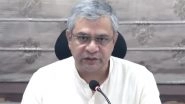Facebook, Instagram and WhatsApp all no longer allow content from Russian state media such as RT. The timing is hardly coincidental.For European users, everything still looks the same when scrolling their timelines on Instagram, Facebook or Threads. In other parts of the world, this week marked a change: between memes, animal videos and vacation photos, media posts still appear, but no longer include links to content from Russian state broadcaster RT, the Rossiya Segodnya news agency or related brands.
Also Read | India and US Reveal Roadmap To Build Secure Global Clean Energy Supply Chain, Creation of Jobs.
That's because Meta, which owns the aforementioned platforms as well as the WhatsApp messenger, has pulled the plug on these propaganda organs worldwide. The group had already throttled the reach of the platforms shortly after the start of Russia's war of aggression on Ukraine in spring 2022, blocking access from the EU and the UK, for example, following a corresponding request.
Also Read | Microsoft Unveils New Windows App for iPhones, Macs, Web and Android; Check Details.
"After careful consideration, we expanded our ongoing enforcement against Russian state media outlets. Rossiya Segodnya, RT and other related entities are now banned from our apps globally for foreign interference activity," Meta announced on September 16.
Publicly accessible Facebook Community Standards explicitly prohibit "foreign interference." But Meta did not answer specific questions from DW about the timing of last week's announcement, or whether the move is related to sanctions or the upcoming US presidential election.
Preventing election interference
Andre Wolf from the Austrian internet awareness association Mimikama has a clear opinion as to why the US group has now taken action. "We are a few weeks from the US election — that is the crucial point. And that's why the step has now been taken, so that Russia can't interfere," Wolf told DW.
Washington had already tightened its sanctions against the Russian propaganda network around the RT channel on September 13. The move was justified with indications that RT, together with the Russian secret services, wanted to manipulate EU candidate country Moldova's presidential election in October to suit the Kremlin's interests. But the White House had also previously warned of Russian influence on the US presidential election in November.
Meta likes to be seen as 'the good guys among the bad guys'
Big tech companies don't exactly have the best reputation to begin with, but from Wolf's point of view, Meta presents itself as "the good guys among the bad guys." Examples of the latter might include Telegram founder Pavel Durov, who was arrested in Paris in late August, accused of failing to cooperate in the fight against illegal content. Or Elon Musk, whose platform X was blocked by a Brazil court after he failed to take steps against right-wing fake news accounts.
Meta, whose oldest brand Facebook has been online for 20 years, has had the longest learning process of them all, said Mimikama spokesperson Wolf. "Because they were the first and biggest, they were always watched closely."
"They were always there when it came to developing something, be it guidelines against hate speech or fake news. Meta was the first to start flagging false reports."
But it's still important to remember that as a private company, Meta still has an interest in emotionalizing and polarizing content that users interact with for as long as possible, he added.
Felix Kartte, an expert on platform regulation at the Mercator Foundation in Essen, Germany, who has worked for the EU, NATO and the global nonprofit organization Reset.Tech, does not believe that Meta needs to present itself as a serious provider. This train has long since left the station, for example when former Facebook engineer Frances Haugen leaked secret internal documents in 2021 grappling with the negative mental health effects of Instagram on teenagers.
"I really believe that a serious external perception is not the main focus for Meta right now," Kartte said. "I think it's more about mitigating possible pushback by legislators or authorities and generating a bit of goodwill."
Just the tip of the iceberg
It's also difficult for Meta to effectively ban Kremlin propaganda from its channels, Kartte added, saying that Russia's propaganda apparatus is prepared for such takedowns.
"It has been apparent for years that Russia is relying less and less on these central propaganda media like RT alone, but has instead developed a decentralized propaganda strategy," he said.
"For example, it finances influencers, that is supposedly normal citizens who run a YouTube channel or a Telegram account, to spread Russian propaganda lines among the population under the guise of citizen journalism." Another method would be doppelganger sites — deceptively real replicas of reputable media platforms that are used to spread propaganda.
Such methods are why Mimikama spokesperson Wolf believes that RT still represents the most harmless part of Russian propaganda — because here at least the Russian influence is known.
"But when I read a page on Facebook called Health Now, for example, and pro-Russian content is constantly appearing between great health tips, I don't immediately recognize the propaganda background," he said. "I find that much more perfidious."
Blocking won't remedy this, Wolf added. "The only thing that helps is pre-bunking, as in educating people about how propaganda and disinformation works."
This article was originally written in German.
(The above story first appeared on LatestLY on Sep 22, 2024 12:20 PM IST. For more news and updates on politics, world, sports, entertainment and lifestyle, log on to our website latestly.com).













 Quickly
Quickly











